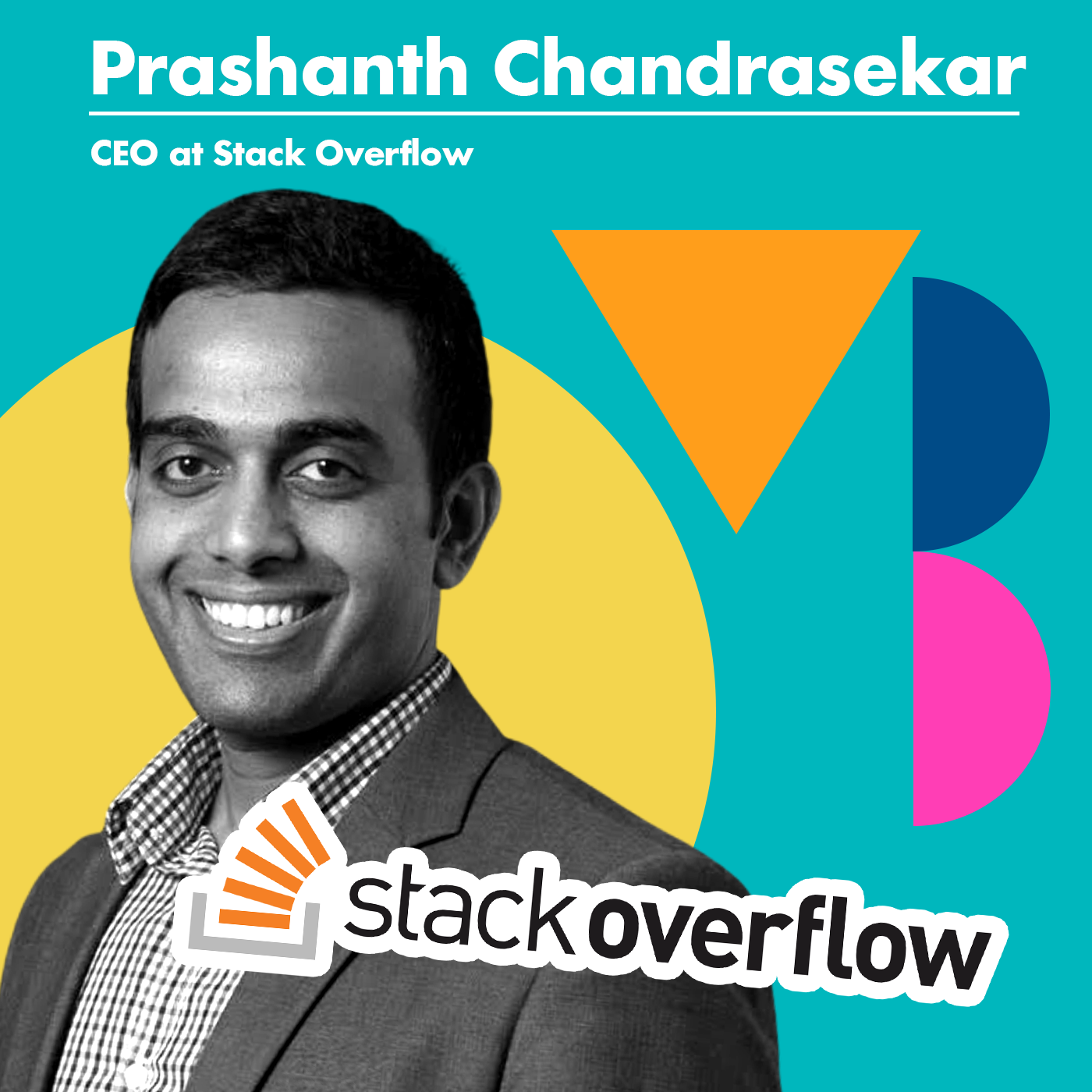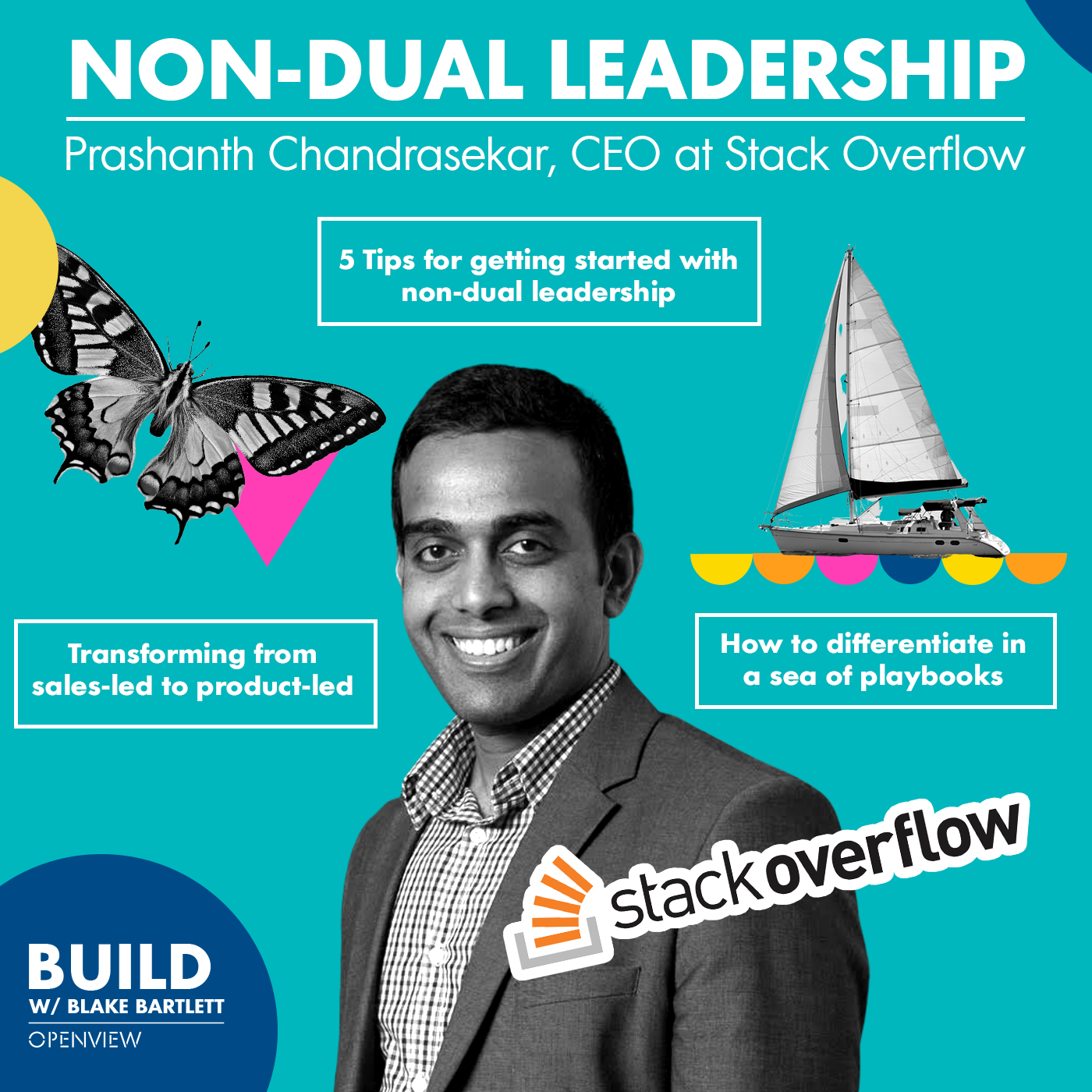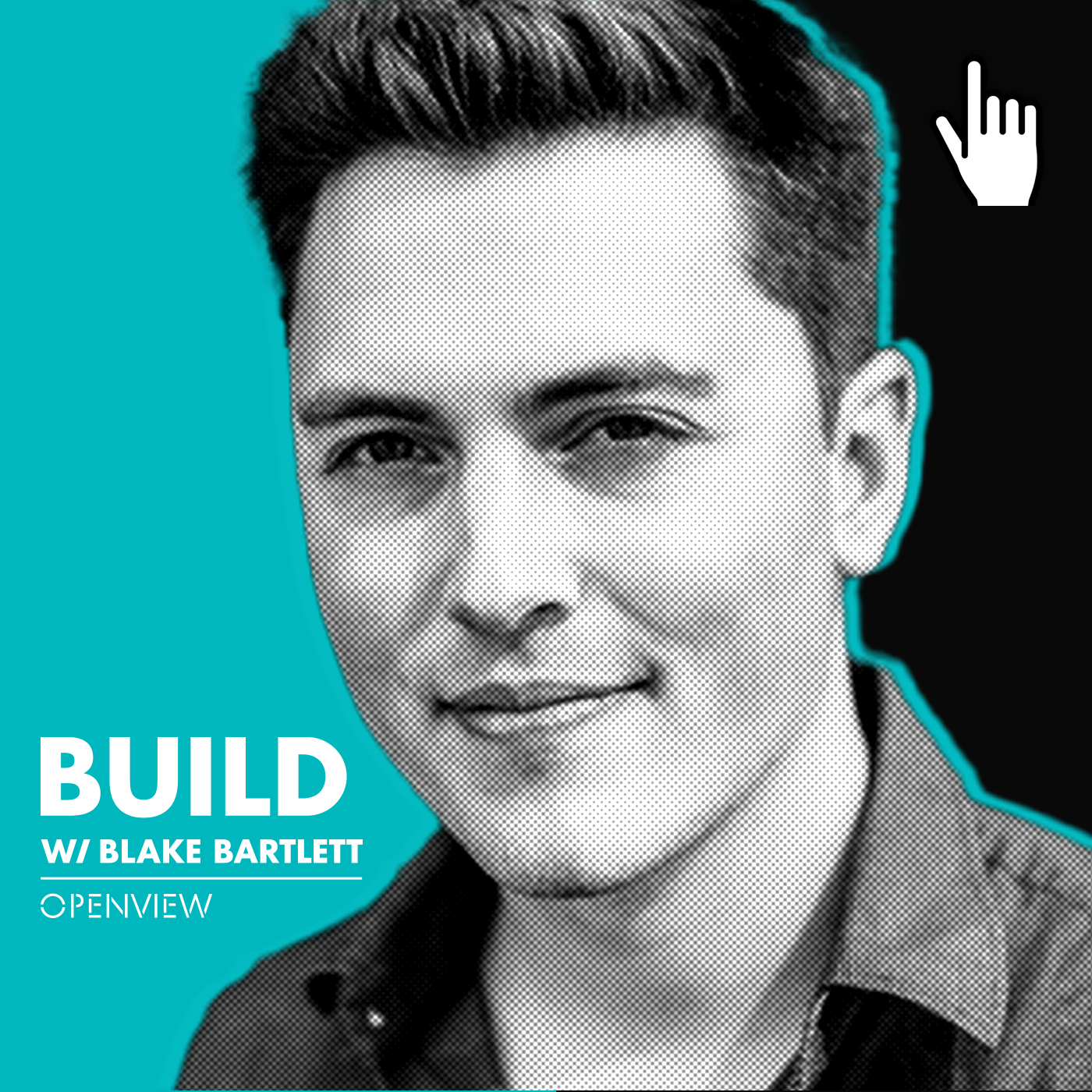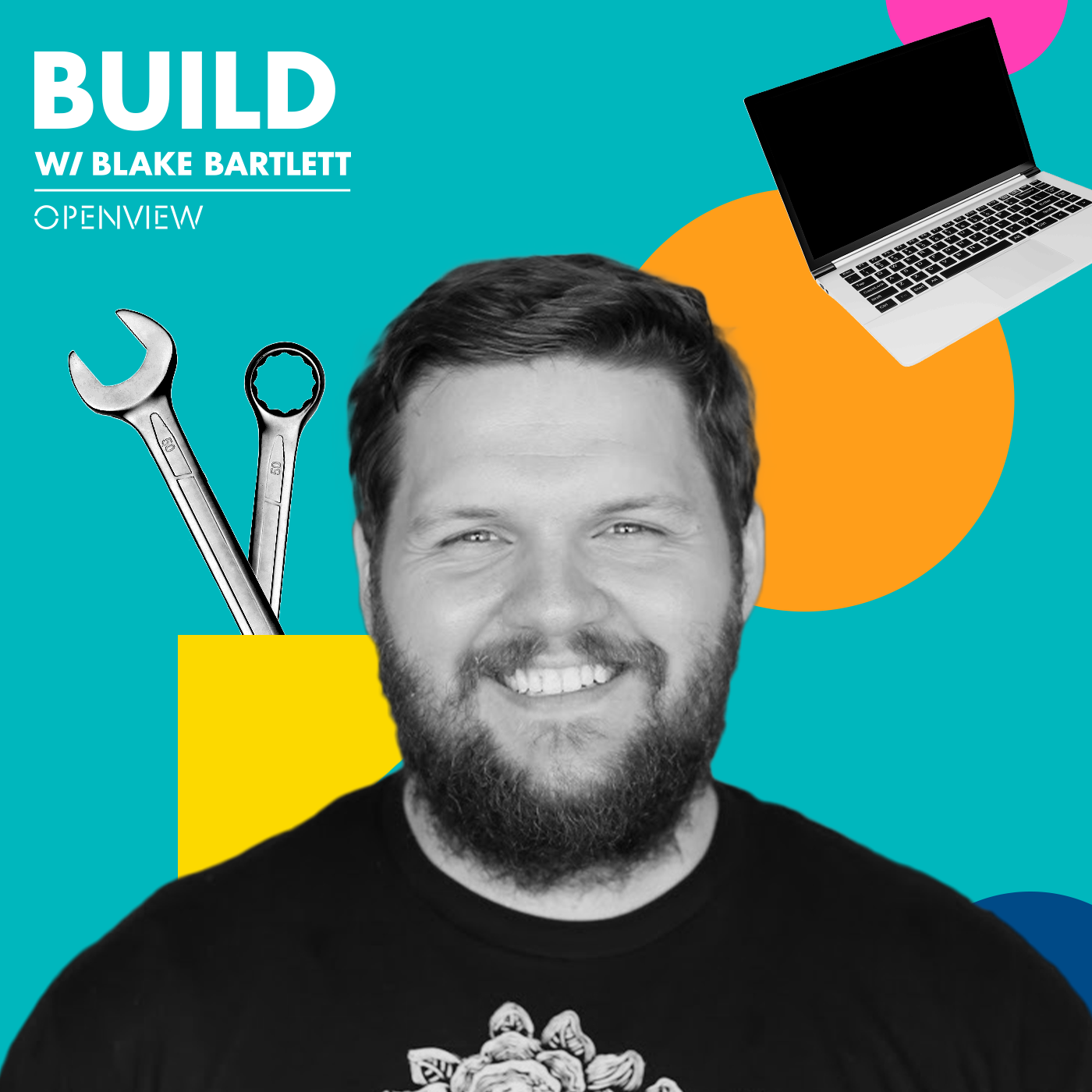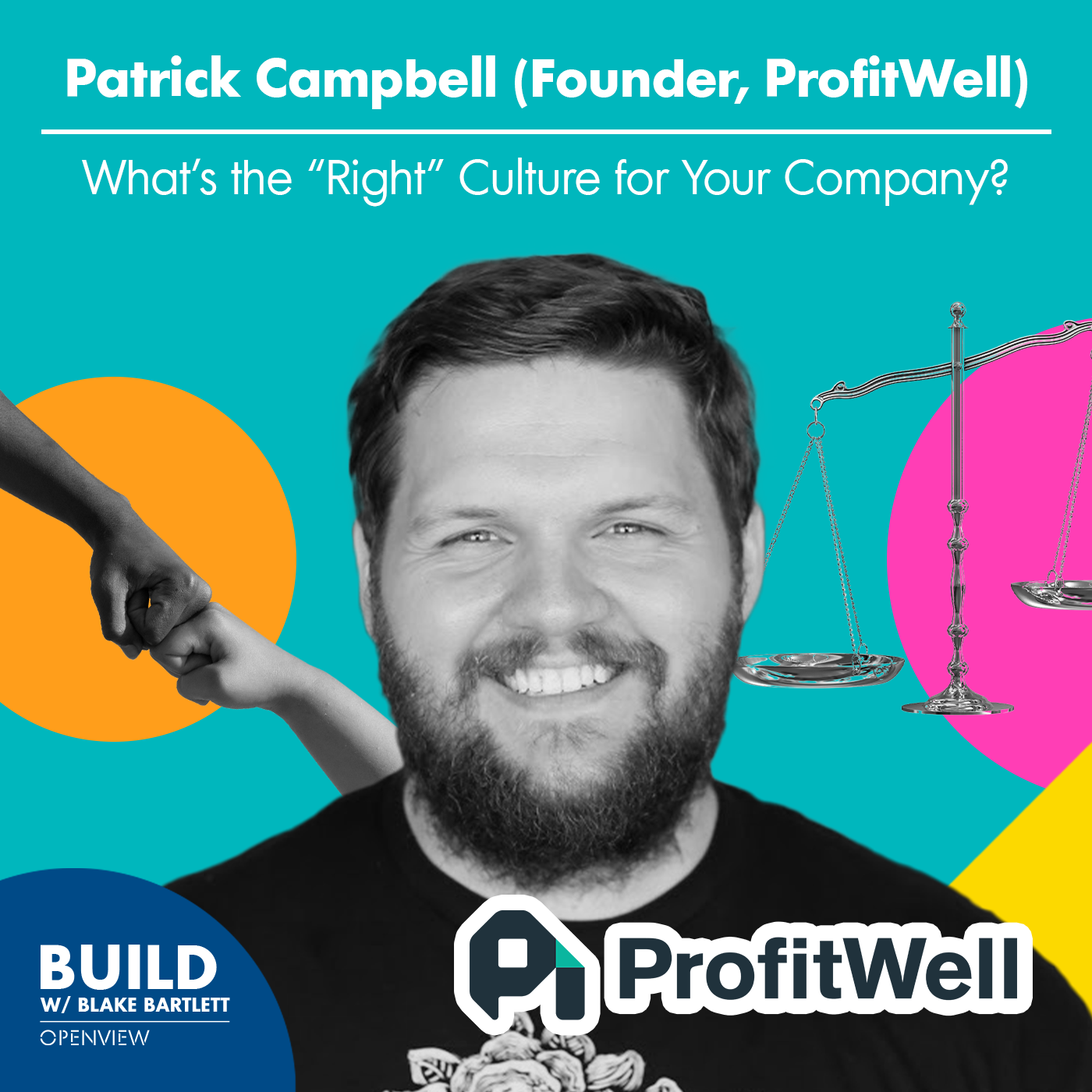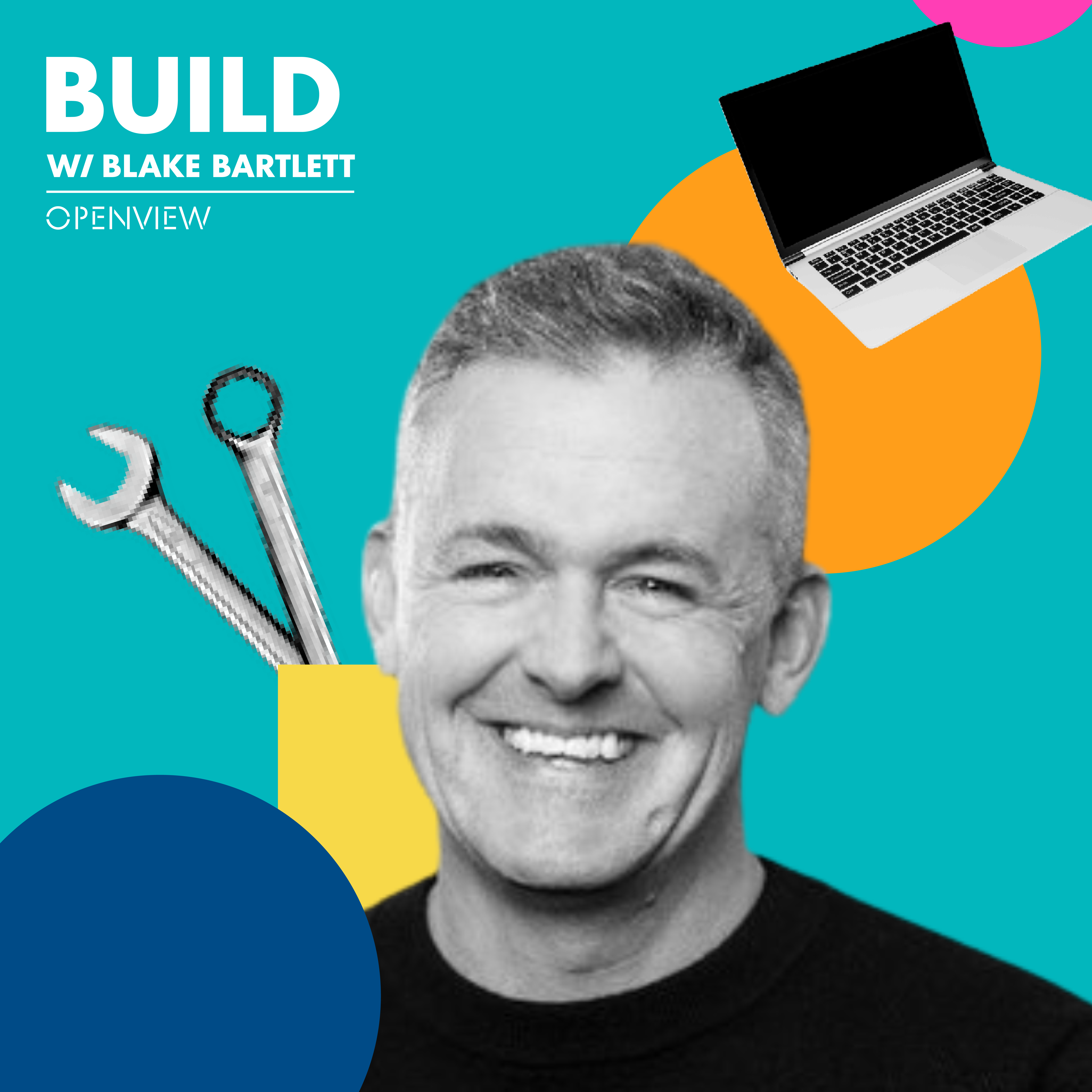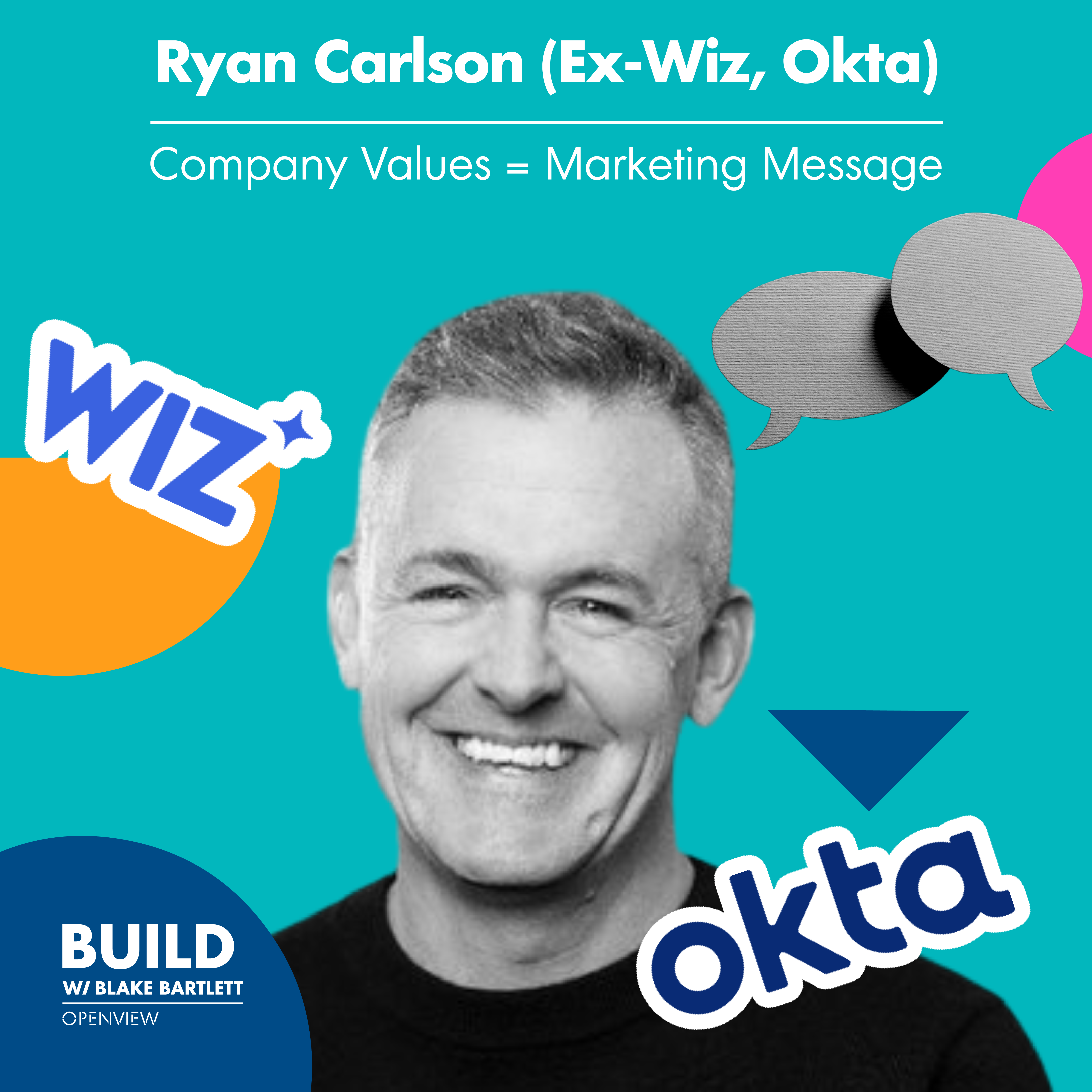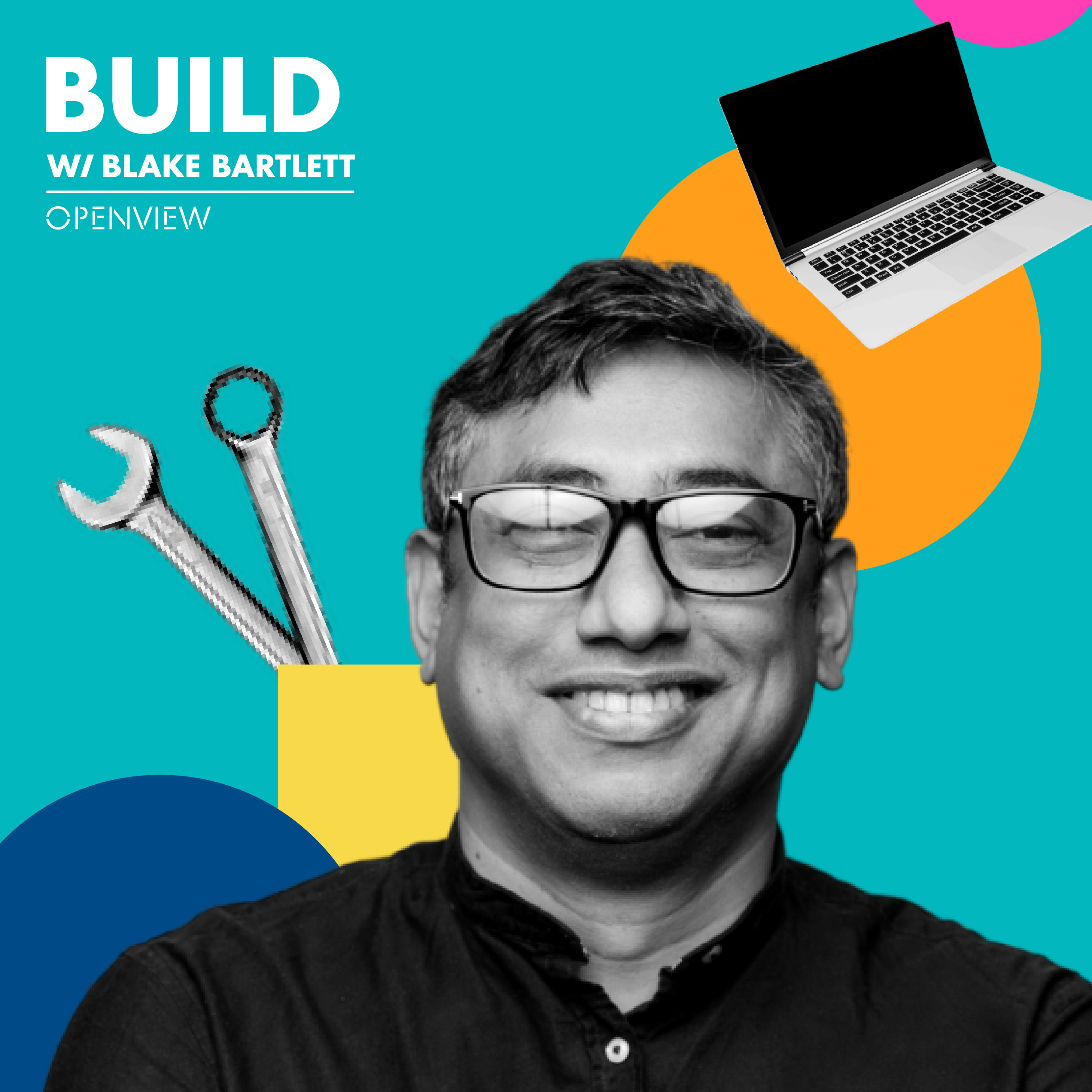Prashanth Chandrasekar (Stack Overflow): Non-Dual Leadership
- 0.5
- 1
- 1.25
- 1.5
- 1.75
- 2
Prashanth Chandrasekar: My own approach to leadership is to be as balanced as I can be, as empathetic as I can be, and that's very important to me.
Blake Bartlett: Welcome back to the BUILD podcast. I'm Blake Bartlett, a partner at OpenView. The world of SaaS is always evolving and we are here to help you adapt, compete, and win with your startup. The BUILD podcast brings you stories and insights from my conversations with the most successful people in SAS. In today's episode, I chat with Prashanth Chandrasekar, CEO of Stack Overflow. We all know and love Stack Overflow, and that's especially true if you're a developer. But today, Prashanth and I are talking about leadership, specifically what Prashanth calls leading in a non extreme way. Leaders often have strong opinions, but when those come with an iron fist in a closed mind, it leads to more problems than solutions. Prashanth walks us through how to communicate and lead in an open non- dual manner that creates what others have termed a marketplace of ideas, where the best approach wins no matter where it came from. All that and more on this episode of BUILD. So let's dive in with Prashanth Chandrasekar. Prashanth, thank you so much for joining us here on the BUILD podcast. It's great to have you on the show.
Prashanth Chandrasekar: Thanks for having me Blake. A big fan of what you do with the product led growth movement. And it's a pleasure to meet you and talk to you today.
Blake Bartlett: So we're talking today about your approach to leadership, a little bit of your leadership philosophy, and maybe setting that up. Let's take a step back and this is not going to be a surprise to anybody, but I think if we all look around in the world today, there is no shortage of strong opinions in our line perspective. So how do you process this dynamic as a leader?
Prashanth Chandrasekar: Especially now in the world, there's some very polarizing views and in many ways, some extreme views on what's the right thing and what's the wrong thing. And I certainly believe it is ironic coming from somebody who leads Stack Overflow, for the world's largest community and platform for technologists where we're all about right and wrong answers because it's very objective questions, right? Like how do you do this on Amazon Web Services or whatnot. And those questions absolutely have a very objective right or wrong answer. But with most things in leadership, at least based on my own perspective and my own experience, I find that it's extremely, I think it would be shortsighted for us not to actually take a more empathetic view that there are likely multiple answers to a particular problem, or there may be a right answer for a particular set of circumstances and context and situations that are in place. But it's hard and it's somewhat disheartening to see sometimes when people take very extreme views on whatever topic. I think being balanced, taking a non- dualistic approach, because the answer is always, it's highly irrelevant in the context of the situation. So if my own approach to leadership is to be as balanced as I can be, as empathetic as I can be and that's very important to me as somebody said, that's just been my style as I've grown up, and those are the things that I've been exposed to. So that's this philosophy.
Blake Bartlett: So what do you mean exactly by non- dualistic?
Prashanth Chandrasekar: If you actually think about any particular situation, especially like leadership situations, it could be how do you deal with a particular issue at work? And the question becomes, you can take a position A or you can take a position B. It's almost like at business school, what they teach you. Why do you take a position and what is your reasoning behind it? And invariably, there's always a good reason to pick A or B, meaning that there are good reasons to pick A and there are good reasons to pick B, right? And it just depends on people's perspective, people's backgrounds, the context of the situation. And oftentimes, and most of the time, in my opinion, there isn't actually a right or wrong answer. It's just that you have to pick one way only because you're forced to pick one. But I think approaching it in a way that is not plus or minus or in the context of Stack Overflow, up vote or down vote, in that context, I think is important because one, you're going to get a lot more people together. You're going to allow people to share that perspective. You're going to be able to listen to people's point of view. And then you'll also be able to explain and understand the decisions that you're making fully because you're fully informed about the various aspects and you have to take a balanced view of the story. And it may be, could come in a few forms. It'll could come in the form of what's appropriate now and what's appropriate in the medium term and what's appropriate in the long term. So might think of it as like, okay, this is appropriate today and we're going to choose this path, but that's not necessarily what's going to happen in the medium term or long term. But providing a path that ultimately balances the best of everybody's perspective so that you're actually getting to a great optimally enhanced answer is what I mean by non- dualistic behavior. And we can talk about a few examples, right? So even in your space or our space around things like product led, many companies might just blindly choose one way or the other. They might choose, I'm a sales company or I'm a product led company. And the answer could be that maybe at this point in time in the company's evolution, it may be appropriate to be product led or could be sales led. Oftentimes, companies switch between being product led or sales led there, or vice versa. Stack Overflow's story, ironically, even though we created a community, which is a completely different topic of how that's different order, we started out as a sales led company when we started selling the enterprise. And now we're on our product led journey, which is why it brought me to you and all the great work that you do. And so the point is that being super dogmatic and super opinionated about one point of view and one direction, in my opinion is especially the world that's moving so rapidly and there's so much dynamism and so on. I think it's shortsighted for leaders to take that approach. I think you have to be openminded and balanced and flexible based on where you are. I would also say one other point in that, sometimes people just go into situations and this again, is a leadership lesson. Is that just taking a playbook and just using it in any context. So somebody did X, Y, Z thing in a different company or approached this playbook to get to a hundred million in revenue or whatever it may be. And just taking that blindly and adopting that in the context of your company, is I think a massive mistake because every company's different. The people are different, the stakeholders are different. In our case, we have an additional stakeholder with the community putting labels. I thin through those elements I think is also a mistake. So I think playbooks are good and frameworks are good to give you a good education to be able to say, here are some of the tools of the trade that you can leverage as appropriate. But blindly following a playbook and really not thinking for yourself with all the conditions around you, I think it's critical. It is a mistake to do it that way. So I think especially as leaders, anybody that is driving the forward direction of an organization or a cause or a community or a company, super important that they just don't rinse and repeat what somebody else has done. You just have to think for yourself.
Blake Bartlett: So how does this relate to the very popular statement, which I love, but the statement of strong opinions loosely held? Do you still end up having a strong perspective or a strong opinion or perhaps a strong hypothesis going into a situation, but you're trying to maintain an open mind to see how can my perspective be enhanced or are we really talking here, try not to have a hard and strong perspective, go in openminded, and then formulate after the fact? How do you think about that dynamic?
Prashanth Chandrasekar: I love that statement, and that phrase, and we use it often at Stack Overflow with my leaders and myself and we talk about. Absolutely the goal is to have opinions that are loosely held, right? You have to have a point of view because as leaders you're being paid and you're being tasked with making decisions all day long. So I think you have to have an opinion and a point of view coming into a situation after you've assessed all the factors that are relevant from your lens. But the interesting thing is that the reason why they have to be loosely held is because you've got one lens, you might have a, let's say it's a go to market lens or a product lens or an operational lens. And each of those lenses are great because you have a lot of deep context and you're in that role because you obviously have a lot of pattern recognition and so on. And then it's like, how does that marry up with the other perspectives in the room? So that's why the opinions need to be loosely held because at some point you're going to have to be able to collectively decide what's appropriate for the company based on again, the circumstance and the situation and so on. Right? So inevitably, somebody's opinions is going to be able to move forward and somebody else's is not right as a result of that. And if you're not going to be flexible in that scenario, it's not going to be a productive conversation. So I'm a big believer that come in with an opinion, absolutely expect it as leaders. Let's come up with the appropriate answer based on all this the various perspectives. And then everybody has to commit. It doesn't matter if you disagreed in the moment, but you have to disagree and commit and kind of move forward as one team. And that's where it leads to this other concept called first team first, which is something that I also really talk about with my own team and how does the team always operate with the first team first mentality? So that's the other aspect. And it comes back to this notion of empathy, right? It's like, are you able to really see the world from somebody else's lens? And it's easy to say, very difficult to do actually. By the way, productive conflict is a very good thing. The notion of Pat Lencioni's five dysfunctions of a team. He would say that that is an important element of great team building and so on. So it's not to say that everybody should agree with everything. Actually, in fact, the opposite. People should debate things and so on. But do it with, again, that first team first mentality that when you walk out of the room, you're going to be committing to whatever you decide.
Blake Bartlett: So let's bring this down into some specific examples. And so you alluded to this earlier talking about maybe some best practices or common sense or commonly accepted ideas that you've thought about differently. So the idea of sales led, product led was one. Can you give us some of these examples?
Prashanth Chandrasekar: Yeah, sure. Let me look at Stack Overflow in itself, right? So I think when you think about stacking, most companies start and obsess about building a great product and then that product, obviously there's a lot of obsession with the customer, what the customer wants and creating product market fit and so on, and growing from there. And that generates a great brand name for that company as a result of having a new product. Almost like the vast majority of companies operate this way. That second pillar of the brand then potentially you might then go and create a community around it, and that's the third pillar. So product, brand and then community is probably perhaps the three pillars or the pit stops that companies move towards or move in the direction rather. For Stack, we did it completely the opposite. We created a community first. And again, for those of your listeners that are not aware of Stack Overflow with the world's largest software developer network and community and platform, we serve close to a hundred million monthly visitors. We have close to 50 million questions and answers on every possible technology topic on our website. And we have a SaaS business, that's a private version of that public platform for companies to use. But we started with that community that grew to a hundred million. And then along the way, we obviously established a massive brand because every developer and every technologist now knows Stack Overflow because they use it every day, because they're getting unstuck by going to our website to find an answer to an issue that they're facing on whatever technology platform or programming language. And we create a great brand after the community. And then third, we are now on our product led journey where we are really creating these SaaS products specifically again, our private Stack Overflow teams product that is third in line. And only now are we going through that process. We're still a hyper growth company. We're very much a SaaS company where we're growing extremely fast. We're growing our team by 30, 40% till the next year. So all the many characteristics that you'd see in the traditional product led company, we have that today. I guess my point is that the order of going community brand and product exactly the opposite of most companies going product brand community is another example of just being very flexible and open and not just following something blindly. It depends on again, the circumstance, why are you here, what problems are you trying to solve, and what is this, the context in which you're solving them.
Blake Bartlett: So it's letting yourself do away with the myth that there is a right way to do things, and instead understand that there are many ways to do things. What is the right way or what is the optimal way for us to do it in our context, in our industry, with everything that we know about what we're trying to accomplish?
Prashanth Chandrasekar: Yeah, exactly right. And I'll give you one more example, Blake, on this, which is because of the fact that we had a hundred million monthly visitors when we went on our product- led journey, after we created a community and brand, most companies, the most traditional ways and I've been in companies where we've done this, where we start with the SMB, then you move to the mid- market and then you go to the enterprise, so it's literally, it's a very tried and true way of saying," Oh, we're moving to the enterprise. My goodness." It's kind of this curve. We literally did the opposite at Stack. So when we launched our SaaS business in 2017, Stack Overflow for teams, we started in the enterprise because we already had a community and a platform that was operating at the scale of a hundred million monthly visitors. So why not? And that the problem that we are solving that is for large companies that want to collaborate and knock down silos and really have asynchronous collaboration and share their knowledge across the organizations. And so it was appropriate for us to launch in the enterprise first. And then only now, ironically, are we launching mid market and then down to S& P and now even freemium, which is again what brought me to you. Our overview is that we are now we just launched freemium for our Stack Overflow teams product just three, four months ago, which is approximately three and a half years after we started our SaaS business. I would say most companies start with a freemium, like what they did the first year of their operation. So that's another example of us doing it, literally the opposite. Now again, everything comes with positives and negatives. I'm not saying it doesn't come with other issues, but the point is that it has to be very specific to your circumstance and your company.
Blake Bartlett: I like this and I think that it will probably give people license and freedom to experiment a little bit more and question assumptions, because I think your example shows that you didn't do it just slightly differently. You did it the exact inverse, the exact opposite and not just on one topic, but on multiple topics. You've flipped it on its head in basically every possible way. But you've been massively successful and it clearly has worked. And so again, I do think that this can be really encouraging to folks to question those assumptions and embrace a different way of doing it.
Prashanth Chandrasekar: Agreed. 100%. Yeah, we are definitely on our own journey. And again, everything can with positives and negatives and we have to deal with different kinds of problems as a result of the journey we've taken. But either way, we're all in the problem solving business. What are your strengths, what do you have going for you, and operating from that vantage point? Because I don't think enough people think about how do you really double down on what you're really good at and then, can use that as momentum. And that goes for companies, that goes for individuals personally. I think people spend way too much time focused on the negatives and the things that are broken or even the areas that they're not believers in, but they're just going through the motions of going and doing those things.
Blake Bartlett: So you mentioned the pros cons of taking different approaches. And so let's talk about some of the downsides or some of the risks that folks need to be mindful of if they are embracing this more non- dualistic way of leading and of operating. One that I could anticipate is that this could lead to basically a consensus seeking extra size and as everybody points to with consensus, it usually isn't the best answer, it's usually the lowest common denominator. And so how do you think about that risk in mitigating that risk with this approach?
Prashanth Chandrasekar: I'm a big believer that especially if you want to win and differentiation, competitive differentiation is the way that you win as the company, you have to be different in some fashion, right? And so by not following the herd, which is ultimately taking a view that may be counterintuitive or different, and yes, you potentially, by considering multiple points of view are not taking either taking a non- dualistic approach, your point around the lowest common denominator, while there may be an element of negativity there where you're not optimizing for a certain vector, fast vector in the near term. However, what it does is it actually brings together a very solid foundation of alignment on again, what's appropriate for this point in time where you get all boats moving forward and you're creating this really solid foundation. And then it's a question of how do you really optimize on levers on top of that, that give you agility to move even faster, again, with a different context in mind next. To put this in perspective, if you start a company and your company starts, if you want to not necessarily put a label, if you're product led or sales led, and you're really trying to have an emergent type of strategy where you decide, okay, what problem are we trying to solve, do we take a community first approach or do we take a product approach, and so on. Ultimately, you're trying to solve a problem. Put the labels aside, let's start with what we're trying to do, what problem are we trying to solve. And then get to a place that it's high scale and how you go about doing that, whether that's with sales people or with your website or both. It doesn't entirely matter as long as you get to a certain stage. And then you decide. At that point, then you've got at least momentum at a certain foundation level that you can then build on. Then you can decide maybe for the next two years, you want to really accelerate product led, or maybe you want to really layer on sales growth because that's the model that you've built. Maybe there are very large contracts. There are companies that just operate with multimillion dollar contracts. They don't have a lot of customers, few customers, massive amounts of revenue per customer that generates a very significantly large company. You've got plenty of examples there of companies that have gone public recently that you can think of that are on the scale. And how do they do that? Of course, they had a foundational product that was built, but they scaled it very heavily with sales. They added a lot of sales people. So again, it depends on the situation on what you're dealing with overall.
Blake Bartlett: So in closing, I want to bring it back to the practical again and the very, very practical. So for anyone who's listening right now and is saying," All right, you're intriguing me, I want to practice this a little bit," how do you do it today, tomorrow? What are some starting points or some pro tips for folks?
Prashanth Chandrasekar: You want to make sure that you're listening constantly to people and taking care of people that are ultimately closest to customers. That's going to give you a sense and appreciation for what you're building and really it will be close to what you're trying to do. And more often than not, people very quickly move away from being close to customers, for whatever reason. They actually assume they're more important things to do. In reality, if you're not close to customers and talk to customers, that's the mistake. So that's one. That will drive a lot of your thought process and empathy on what to actually think about for your company. That extends to things like ultimately, you own the decisions you make as a leader, right? So whatever decision you make, it may not be right or wrong, but ultimately you're responsible. It doesn't matter in the end. You can't point the finger to anybody. You'd have to own that decision and just be open to ultimately, you want to think big and inspire belief and make sure that people are rowing in the same direction and so on. So that's more of a leadership philosophy. It's at least how I think about what's important in my own personal approach to various situations. Then I would say practically speaking for leaders that are faced with scaling their organizations and so on is to really assess along with their leadership teams, what is appropriate for their company at this stage in time, right? And let's throw the titles out, throw the labels out of the room and really decide which direction you want to go in for the next period of time. It could be phased in many ways and always be flexible enough that you're always open to changing your opinion because there's going to be new dynamics that are going to be at play and just be very, very flexible with that approach. So those are probably, I would say some broad thoughts playing on how leaders should approach the problem.
Blake Bartlett: Well Prashanth, this has been a great conversation. I've learned a lot from it. And what I think I love the most is that we all know the classic saying of the way that you be successful in life across any different discipline or dimension is to be contrarian and right, which is like most things, easier said than done. But I think this idea of non- dualistic thinking, this idea of not being dogmatic, actually provides a roadmap and provides folks a lot of practical advice and then real life examples, which then in turn can give them courage to know how to actually accomplish being contrarian and right and stick to it versus letting the wisdom of the crowd or the herd influence you to become more generic and less specific to your own path and to your own company.
Prashanth Chandrasekar: Yeah, no, absolutely Blake. And I hope it's useful to folks. And also, as I mentioned at the top of the hour, I think it's interesting for me to come to this somewhat realization and having in fact, after leading Stack Overflow, which is a very objective type of platform, which has the right answer, has the wrong answer to detectable questions and that's as dualistic as it comes, in the context. But when it comes to leadership, I think it's very, very different in my opinion. I think you have to put that out of your vantage point and really think about what's appropriate.
Blake Bartlett: Well thanks so much for joining us on the BUILD podcast. It was great to have you on.
Prashanth Chandrasekar: Thank you, Blake. Thanks having me.
Blake Bartlett: Thanks for listening to this episode of BUILD. If you like what you've heard, leave us a review on Apple Podcasts and subscribe to stay up to date with all the new episodes. Want more insights from OpenView? Follow me, Blake Bartlett, on LinkedIn for daily PLG content and head to our website to sign up for our weekly newsletter.
DESCRIPTION
Founders often have strong opinions and extreme perspectives. In the early days, this is good because it leads innovators to start companies. But as a team scales, leaders need to adopt an open mindset. Prashanth describes how this approach has led Stack Overflow to huge success by embracing counterintuitive strategies.
Key Takeaways:
[3:18] What does Prashanth mean exactly by non-dualistic leadership?
[5:02] Prashanth shares examples of non-dualistic leadership.
[7:40] Prashanth shares his thoughts about the statement “strong opinions loosely held.”
[10:22] Prashanth shares examples of some best practices and commonly accepted ideas that he had thought about differently.
[16:41] How does Prashanth think about the risk and mitigating the risk of a consensus-seeking approach?
[19:10] What are some sort of starting points for those trying to put this approach into practice?
Mentioned in this episode:
Sign up for OpenView's weekly newsletter
Prashanth Chandrasekar, CEO at Stack Overflow
Follow Blake Bartlett on Linkedin.
Podcast produced by OpenView.
View our blog for more context/inspiration.
Today's Host
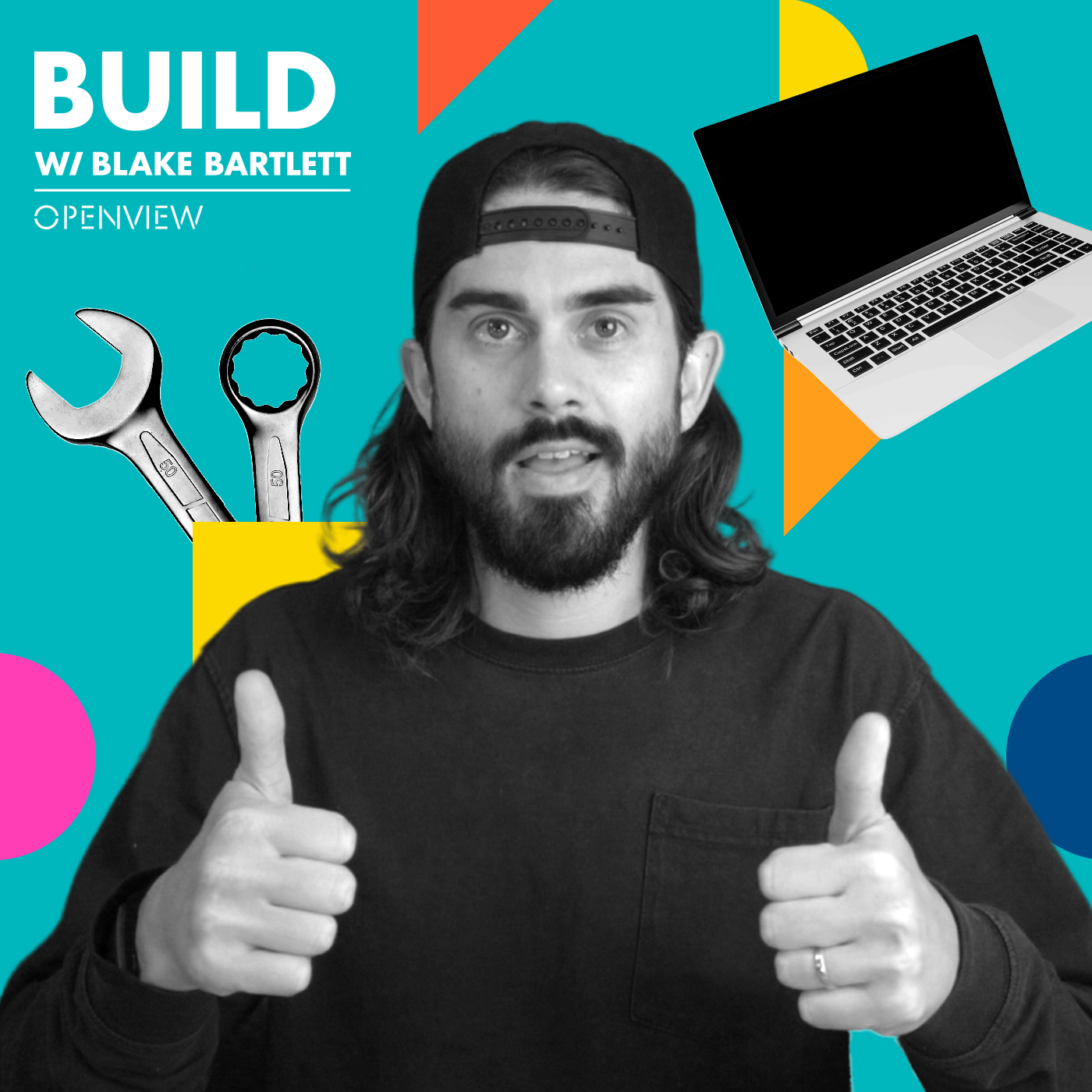
Blake Bartlett
Today's Guests
